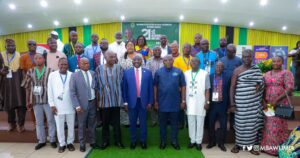Metropolitan, Municipal and District Assemblies (MMDAs) have been urged to move away from just providing essential services to becoming agents for development of their localities.
Vice President Dr. Mahamudu Bawumia said this can be achieved by harnessing all the natural, material and human resources within their jurisdictions to bring the needed development, create jobs, reduce poverty, increase income levels and raise the needed Internally Generated Funds (IGF) to complement other sources of funding from central government.
“As MMDAs, you must re-evaluate your local strengths and weaknesses in light of changing roles you have to play in meeting the needs of your respective citizens. We are aware that some MMDAs are already engaged in the process of revitalising their local economies, and I believe others will follow the trail,” he added.
To this end, he said, local assemblies need to reconsider the growth they desire for their localities – taking into consideration resilience and inclusivity.
Addressing the 21st Biennial National Delegates Conference of the National Association of Local Authorities of Ghana (NALAG) in Kumasi, Dr. Bawumia said: “The pandemic has taught us that networks and mutual learning and cooperation among peers are very important”.
 Against this backdrop, he asked MMDAs to collaborate through knowledge-sharing if they want to achieve a uniform and sustainable development, adding that “learning must take place between MMDAs and toward interpersonal interactions that are well-matched”.
Against this backdrop, he asked MMDAs to collaborate through knowledge-sharing if they want to achieve a uniform and sustainable development, adding that “learning must take place between MMDAs and toward interpersonal interactions that are well-matched”.
Local authorities with similar interests or challenges, he said, should therefore be paired, and this will create the opportunity to learn from each other.
“Such twinning programmes will enhance the transfer of knowledge between these local authorities to increase their capacities and knowledge to mitigate and adapt to climate change, accelerate economic transformation, explore strategies for alternative and effective transport systems, as well as better ways to manage waste and sanitation.”
Furthermore, he called on NALAG to work with all relevant state and non-state actors to bring needed development at the local level through innovation and dialogue, to ensure that the local economies are strengthened and take advantage of the digital space to accelerate local development.
Also, on the record of poor women’s participation in local governance, he reiterated the need to consciously and deliberately change the status quo by promoting their inclusion in local governance and decentralisation.
The Minister for Local Government, Decentralisation and Rural Development, Daniel Botwe, on his part charged MMDCEs to harmonise and coordinate the implementation of all central government policies.
For instance, he said MMDCEs are required to implement central government budget statements and economic policies.
To ensure cost-recovery by government from providing the infrastructure for collection of the property rate, he announced that a sharing ratio will be agreed upon with the MMDAs.
The minister attributed the haphazard and uncontrolled developments in MMDAs to the congestion, pollution and perennial flooding of most towns and cities.
As a result, he said, all MMDAs are to ensure that the Greening Agenda of government is implemented to the letter as a policy measure.
The Mamponghene, Nana Osei Bonsu who chaired the occasion, asked government to reconsider the active integration of traditional authorities as a priority policy position for development of communities in the local governance setup.
He said: “Even though the political heads play critical roles at the MMDAs, they are appointed by their political parties and governments but are changed by the political cycle of elections. This is unlike the traditional authorities, who are permanent and work with all persons irrespective of party affiliation,” he said.
Additionally, he said, the welfare and conditions of service for assembly members should be paramount in all reforms being proposed within the local government system.
He opined that building the local economy, creating jobs and reducing poverty require the assemblies to take up new roles and responsibilities.
This, according to Mamponghene, should be by working with all the relevant stakeholders in both the public and private sectors for businesses to thrive, since development of the local area is intrinsically linked to total development of the country.










